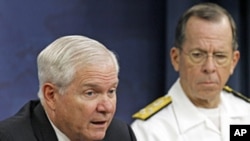U.S. Defense Secretary Robert Gates says he has not seen any evidence that suggests top Pakistani officials knew that al-Qaida leader Osama bin Laden was hiding in their country. His comments come as U.S. lawmakers debate reevaluating Washington’s relationship with Islamabad following the killing of bin Laden by U.S. Navy Seals near the Pakistani capital.
U.S. Defense Secretary Robert Gates says that so far, there has not been any evidence that top Pakistani officials knew the world’s most wanted man, Osama bin Laden, was hiding in their country.
“I’ve seen no evidence at all that the senior leadership knew," said Gates. "In fact, I’ve seen some evidence to the contrary. And we have no evidence yet with respect to anybody else.”
However, he said he still believes somebody in Pakistan probably knew about bin Laden.
It is this unknown factor that has some lawmakers in Congress leery of continuing to provide billions of dollars in aid to Pakistan.
Speaking with reporters Wednesday at the Pentagon, Gates said he understood the lawmakers’ frustration, but he does not think U.S. aid to Pakistan should end.
He said he believes Pakistanis have suffered enough with the realization that U.S. special forces were able to mount a successful, covert raid deep into their territory to get bin Laden.
“If I were in Pakistani shoes, I would say I’ve already paid a price," he said. "I’ve been humiliated. I’ve been shown that the Americans can come in here and do this with impunity.”
Gates said the United States and Pakistan now should move forward on their common interests.
Speaking alongside Gates, U.S. Chairman of the Joint Chiefs of Staff, Admiral Mike Mullen, said the United States still is working to reestablish trust with the Pakistanis after largely abandoning their country and the region following the Soviet withdrawal from Afghanistan in 1989.
Mullen says Pakistan is too important in the current fight against terrorism to marginalize.
“I think the region continues to be critical, and our relationship continues to be critical," said Mullen. "I think it would be a really significantly negative outcome if the relationship got broken.”
He said it is this partnership that has helped Islamabad tackle militants based in the country’s northwest who kill Pakistani civilians and threaten regional stability.
Pakistan is slated to receive billions more in aid from Washington in the coming years. It is the third-largest recipient of U.S. security aid and reimbursements after Afghanistan and Israel.
Gates: No Evidence that Pakistan Knew About bin Laden
- By Sean Maroney




